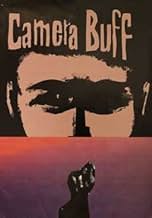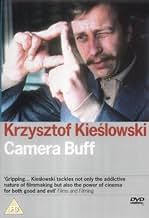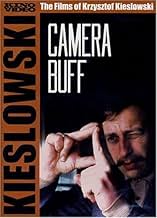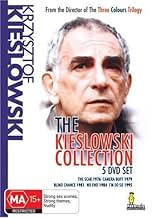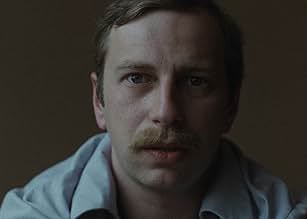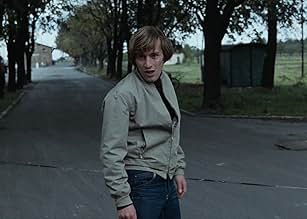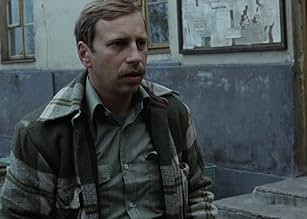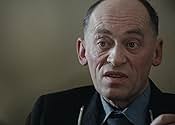PUNTUACIÓN EN IMDb
7,8/10
8,8 mil
TU PUNTUACIÓN
Filip compra una cámara cuando nace su primer hijo. Como es el primero en la localidad en tener camara, es nombrado fotógrafo oficial.Filip compra una cámara cuando nace su primer hijo. Como es el primero en la localidad en tener camara, es nombrado fotógrafo oficial.Filip compra una cámara cuando nace su primer hijo. Como es el primero en la localidad en tener camara, es nombrado fotógrafo oficial.
- Dirección
- Guión
- Reparto principal
- Premios
- 6 premios en total
Reseñas destacadas
Jerzy Stuhr buys an 8mm film camera to film his newborn daughter. The manager of the plant he works at hears about it, and tells him to shoot a film about the plant's 25th anniversary. Stuhr figures out the basics of editing, but the director suggests changes he doesn't like. Ignoring this, he takes the film to an amateur festival and wins a prize. As his obsession with film grows, his wife, Malgorzata Zabkowska, suffers postpartum depression, exacerbated by the realization that the things he had once wanted -- her, a daughter, a quiet life -- are no longer his goals.
Krzysztof Kieslowski's third feature is a meditation on the power of film and the inability of a finite work of art to accurately reflect the infinite world, or even the myriad complications of a small town. As Stuhr's skills and connections grow, he comes to see everything through an imaginary camera lens, not seeing anything outside his self-imposed frame. Beautifully shot by five cameramen, dialogue by Stuhr, make this a fine journey of self-discovery.
Krzysztof Kieslowski's third feature is a meditation on the power of film and the inability of a finite work of art to accurately reflect the infinite world, or even the myriad complications of a small town. As Stuhr's skills and connections grow, he comes to see everything through an imaginary camera lens, not seeing anything outside his self-imposed frame. Beautifully shot by five cameramen, dialogue by Stuhr, make this a fine journey of self-discovery.
I really liked this film because it dared to be different and it was an excellent study of psychology. This movie was about a Polish man who scraped together his money in order to by an 8mm camera to film his new baby. However, shortly after getting the camera and beginning filming his wife and child, he gets really hooked on making his little films--and seems to film almost everything around him. At first, it's fun, but then it becomes an obsession. In the process, instead of LIVING and EXPERIENCING life with his little family, he is filming them in a very detached way. However, he is so into the filming that he hardly recognizes his wife's growing anger over that ^&@#*^@! camera! Then, when his boss sees him filming and asks him to make a film for the company, his problem grows by leaps and bounds. He seems to see himself as the next great documentary maker and begins to enter competitions and send his films to the television network. To his wife's chagrin, he receives positive reviews and by this point she's lost him--they have no real life together. Where the film goes from there I will leave for you to watch. It is a fascinating psychological study of a man and his obsession--as well as the impact this ultimately has on others around him. An excellent film.
I found this film enthralling and revealing about a man gradually discovering his purpose in life and the effect it has on those around him as well as the obstacles he now has to face. He must now face the political as he takes a stance on social issues in his life and his town. His naiveté is warming and it demonstrates what a great actor Stuhr is that the film chips away at this slowly as he awakens to the new realities of his life. From a man who had everything at the beginning he has now shattered his domestic life but gained something some would say far richer and more permanent for his soul, a purpose. One that helps him to 'understand what this shitty life is about'. The final shot brings the film full circle as we see a man in the grip of his obsession.
Filip buys an eight-millimeter movie camera when his first child is born. Because it's the first camera in town, he's named official photographer by the local Party boss. His horizons widen when he is sent to regional film festivals with his first works but his focus on movie-making also leads to domestic strife and philosophical dilemmas.
"Camera Buff" explores censorship in Communist Poland and its repression of the individual's expression of his observations. Filip also confronts the consequences of a man who discovers new possibilities and finds his former world, which had been so fulfilling before he'd discovered filmmaking, rendered dull, old, and limited.
The story is interesting solely because of the Communist aspect. If it was just a story of man who becomes obsessed with making movies, it would be just another story about movies told in the form of a movie. But the Communist aspect? If one man in town has a camera, it suddenly becomes a tool for the entire city. It's interesting. This could be beautiful or ugly, depending on who happens to be in power.
"Camera Buff" explores censorship in Communist Poland and its repression of the individual's expression of his observations. Filip also confronts the consequences of a man who discovers new possibilities and finds his former world, which had been so fulfilling before he'd discovered filmmaking, rendered dull, old, and limited.
The story is interesting solely because of the Communist aspect. If it was just a story of man who becomes obsessed with making movies, it would be just another story about movies told in the form of a movie. But the Communist aspect? If one man in town has a camera, it suddenly becomes a tool for the entire city. It's interesting. This could be beautiful or ugly, depending on who happens to be in power.
Ah for the love of film
In 2006, I was one internet flight ticket transaction click away from moving to the area of Poland for the duration, but didn't. The "good" reason being is that I suffered some seriously grave trepidation over the fact that I would need to have two months salary in the bank before I'd EVER raise enough capital to buy an 8 mm motion picture camera. And this was in 2006. Sadly, these hypertensive concerns about finances low, all sleepless nights over equipment I don't have, and from where in the heck is the next camera going to come turned out to be relative in the scope of things in a sick and cyclical sense- and after interfacing with the characters of Kyrstof Kieslowski's incredibly moving Humanist Dark-Dramity, Camera Buff, for an hour and half, I'm just now harboring more than a few serious regrets about not actually abandoning the competitive, spiraling nightmare that is Western Life when I had the chance.
Camera Buff is a wonderful story about a factory worker Filip (Jerzy Stuhr); a man who, in his thirties, begins to see life anew through the view finder of a small gauge movie camera. Originally purchased for "two months salary," which "pissed his wife off" to document his newborn daughter's first few steps, the 8 mm camera is quickly realized as something more useful than just a device for making home-movies. The narrative's tension is organized specifically around the reaction to the films of the institutional power structures and forces around Filip that essentially commissioned, financed, and instigated the films themselves along with Filip's newly discovered and unyielding passion for creating them as he sees fit.
If you view the Kino Video DVD release of this film, perhaps even more profoundly affecting than the feature as an augury of hope for the human race is the sixteen minute black and white documentary entitled Talking Heads in which Kielowski conducts helter-skleter a multitude of fifteen second interviews about "who you are" and "what you want" with Polish citizens, age zero to one-hundred, across all walks of life starting at the year 1979 with a little gurgling baby. In all, it's wonderful material and has me seeking out more Kieslowski.
Camera Buff is a wonderful story about a factory worker Filip (Jerzy Stuhr); a man who, in his thirties, begins to see life anew through the view finder of a small gauge movie camera. Originally purchased for "two months salary," which "pissed his wife off" to document his newborn daughter's first few steps, the 8 mm camera is quickly realized as something more useful than just a device for making home-movies. The narrative's tension is organized specifically around the reaction to the films of the institutional power structures and forces around Filip that essentially commissioned, financed, and instigated the films themselves along with Filip's newly discovered and unyielding passion for creating them as he sees fit.
If you view the Kino Video DVD release of this film, perhaps even more profoundly affecting than the feature as an augury of hope for the human race is the sixteen minute black and white documentary entitled Talking Heads in which Kielowski conducts helter-skleter a multitude of fifteen second interviews about "who you are" and "what you want" with Polish citizens, age zero to one-hundred, across all walks of life starting at the year 1979 with a little gurgling baby. In all, it's wonderful material and has me seeking out more Kieslowski.
¿Sabías que...?
- CuriosidadesThe film's opening scene and Irka's nightmare about a hawk killing a chicken are reminiscent of Ken Loach's Kes (1969) -- a film about a boy who takes to training a wild kestrel in order to escape his troubled life. Later, Filip can be seen reading a filmmaking text and turning to a section about Ken Loach and Kes (1969). This reference is twofold. First, Filip is clearly inspired by filmmakers like Loach in making social realist films about working-class people. Second, Irka is tormented by images mirroring Kes (1969) which represent her husband's budding obsession with this type of filmmaking.
- Citas
Piotrek Krawczyk: [looking at a roll of motion picture film] It's beautiful what you guys do. A person's no longer alive, yet she's still here. It's beautiful.
- ConexionesFeatured in Fejezetek a film történetéböl: A lengyel film (1990)
Selecciones populares
Inicia sesión para calificar y añadir a tu lista para recibir recomendaciones personalizadas
- How long is Camera Buff?Con tecnología de Alexa
Detalles
Contribuir a esta página
Sugerir un cambio o añadir el contenido que falta

Principal laguna de datos
By what name was El aficionado (1979) officially released in India in English?
Responde

